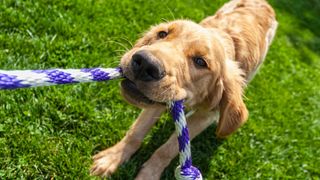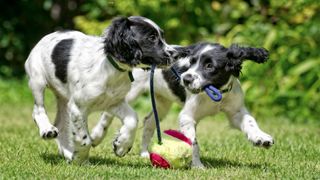Puppy growling when playing: what does it mean and is it aggression?
Is your puppy growling when playing? We break down what this could mean

As humans, we’ve been conditioned to automatically think a puppy growling when playing is a bad thing. At first, many dog owners will instinctually see it as a sign of aggression that should be trained out of a dog or a puppy, but there’s more to growling than initially meets the eye (or ear…). Just because a puppy is growling when playing, it doesn’t necessarily mean that they’re being aggressive.
Many puppies find playing with the best puppy toys so exciting that they become very vocal. This can understandably seem disconcerting to first-time dog owners, but it’s simply just the puppy enjoying the play.
Unfortunately, there can be reasons why a puppy starts growling during play that can indicate a potential issue. Whether it’s the beginnings of resource guarding, the puppy is getting frustrated with the play, or they’re experiencing some fear, being able to understand what your puppy is feeling is important.
If you think that your puppy is growling for another reason other than play, it’s really important to remember that the growling is a good thing. If your puppy wasn’t growling, then you might not know that there was a potential issue until more problematic behaviors started to appear, such as snapping or even biting. By growling, your puppy is telling you that they’re uncomfortable with something – and you now have a great opportunity to help them.
Puppy growling when playing? Here's what it means
We consulted with Lara Sorisi, an APDT-certified dog trainer and a championship gundog trainer. She said, “It’s really important to look at the type of play that you’re doing with your puppy. It’s like when children play together – if one child escalates it, the other child can match the energy and then the play becomes inappropriate and overwhelming. We need to make sure that we’re conscientious that we’re teaching our puppies to play correctly by ensuring that any play is done in an appropriate manner.
“To deter inappropriate growling, I would recommend introducing a start and finish cue when you’re playing with your puppy. So, for example, say ‘Tug’ when starting a fun game of Tug with them, and then say ‘All done’ when it’s over.
“You also have to make sure that you’re playing appropriately for your puppy’s age. Pulling them around your living room when they’re a nine-10 week-old puppy is going to be pretty inappropriate, as when they get older they’re going to think that this is acceptable.”
So, what are the reasons why a puppy might growl during play? We’ve listed some of the most common causes below to help you understand the potential reasons for a puppy growling when playing.
However, if you’re experiencing this issue, then we would advise you to consult with a qualified professional, such as a dog trainer or behaviorist that’s registered with an accredited organization, such as the APDT, CCPDT, or CAPBT. Take a video of the behavior that’s concerning you and the professional will be able to help you understand what’s going on for your puppy.

Lara Sorisi is a science-based and force-free dog trainer that has been working with dogs for many years. She is accredited by the APDT (Association of Pet Dog Trainers), which is one of the most rigorous dog training qualifications available. Lara holds a bronze-level qualification with UK Sniffer Dogs, which means that she is an accredited UK Sniffer Dogs instructor. Lara has trained her own dogs to be trial winners and dedicates her time to helping other dog owners in group and one-to-one sessions.
The puppy is simply excited
It can be easy to forget that puppies are essentially the equivalent of toddlers and they aren’t fully capable of regulating their own emotions and behavior yet. Some puppies are more vocal than others and are simply expressing their enjoyment of the play.
The puppy is displaying resource guarding
Resource guarding is when a dog develops a strong possessiveness over items. This can often be food or toys, but can actually be applied to anything from a piece of garbage from the bin to even people. If your puppy begins to stand over the toy that you’re playing with and they don’t want you to take it back, this might be a beginning sign of resource guarding.
If you think that your puppy is showing signs of resource guarding, then you’ll need to take this seriously. We would recommend looking for a certified trainer or a qualified behaviorist to help you tackle this issue. Beware of any trainers that recommend aversive or punishment-based methods, as this will compound the issue and make it worse in the long run, even if the trainer promises ‘instant results’.
The puppy is becoming frustrated
It can be difficult to distinguish whether a puppy is growling because they’re enjoying play, or because they’re becoming frustrated. To prevent a puppy from becoming frustrated with play, make sure that you take plenty of breaks. You’ll also want to ensure that the puppy regularly ‘wins’ whatever game you’re playing. So, for example, if you’re playing Tug, then let the puppy take the toy from you occasionally. However, try not to do this too much, or you’ll find that the puppy might start to find the game boring.
The puppy is fearful
A puppy will generally enter its fear periods at eight-11 weeks and six-14 months of age. These periods are genetically pre-programmed into your puppy and are designed to help protect it. This is why proper socialization is so important, as it helps your puppy grow used to the world around it.

Playing vs aggression: what to look out for
If you’re unsure on the differences between a puppy being playful and a puppy developing signs of aggression, we’ve broken down the key aspects of body language to look out for in both instances. However, it’s important to note that these are guidelines only and if you’re unsure, then it’s best to take a video of the behavior that’s concerning you and show it to a qualified professional.
Lara says, “It’s important to look for signs in your dog’s body language that they’re feeling a little bit overwhelmed, such as head turns, lip-licks, nose-licks, or whale eye. I would also look at their tail position and body height as well to make sure that the dog is happy with the game that you’re playing.”
A playful puppy will show behaviors such as:
- Play bows
- Relaxed mouth and tongue
- Wiggling backside when wagging their tail
- Loose and wiggly body
- Brief pauses during play
A puppy showing signs of aggression will show behaviors such as:
- A flagged tail (straight up)
- Mouthing on the owner
- Getting frantic
- Standing over and guarding the toy
- Lunging forward
- Showing teeth
- Becoming still and rigid
- Air snapping
Meanwhile, you will also want to look for signs of appeasement in your puppy as well. If your puppy is displaying these, then you’ll want to stop the play before the situation escalates:
- Lip-licking
- Running away from you
- Whale-eye
- Showing their belly
- Tongue-flicks
- Yawning
- Hard blinking
- Lowering the head and ears

How to handle growling in puppies
If your puppy is simply growling out of excitement and enjoyment when playing, then there’s no need for you to do anything. You’ll soon learn to love the sound of your dog enjoying themselves and having fun! If the growling starts to get a little too intense, we recommend redirecting your puppy to a calming activity, such as using one of the best snuffle mats with some tasty treats.
Lara says, “To help make sure that your puppy is enjoying the play, give them regular breaks and give them a chance to have a shake-off (this releases tension in dogs). Scatter-feeding them will help bring the arousal level down and then you can reintroduce the game again. By giving your puppy regular breaks, you’re less likely to have inappropriate behavior crop up from over arousal.”
If you think that your puppy is growling for reasons other than enjoying their play, then it’s best to consult with a professional. Lara says, “APDT-certified, CCPDT-certified and IMDT-certified trainers are subjected to rigorous assessment. When it comes to going to a professional, it’s important that they have a really good knowledge of behavior, learning theory, and body language. The only way you’re going to know that your trainer has all of that is by going to one that’s certified by an accredited organization.”
Looking for more advice for your pup? We asked a vet; when should I stop feeding my dog puppy food?
PetsRadar Newsletter
Get the best advice, tips and top tech for your beloved Pets
Louise Carey is a freelance writer and the Editor of sister website Top Ten Reviews. She has been working in publishing for seven years, contributing to publications including The Independent, TechRadar, Digital Camera World and more. As the proud pet parent of a reactive border collie with a food allergy, it’s been necessary for Louise to explore a variety of fun and exciting ways to enrich an energetic dog that can’t always go on walks. She’s passionate about sharing the information she’s learned to help other pet owners as well.
